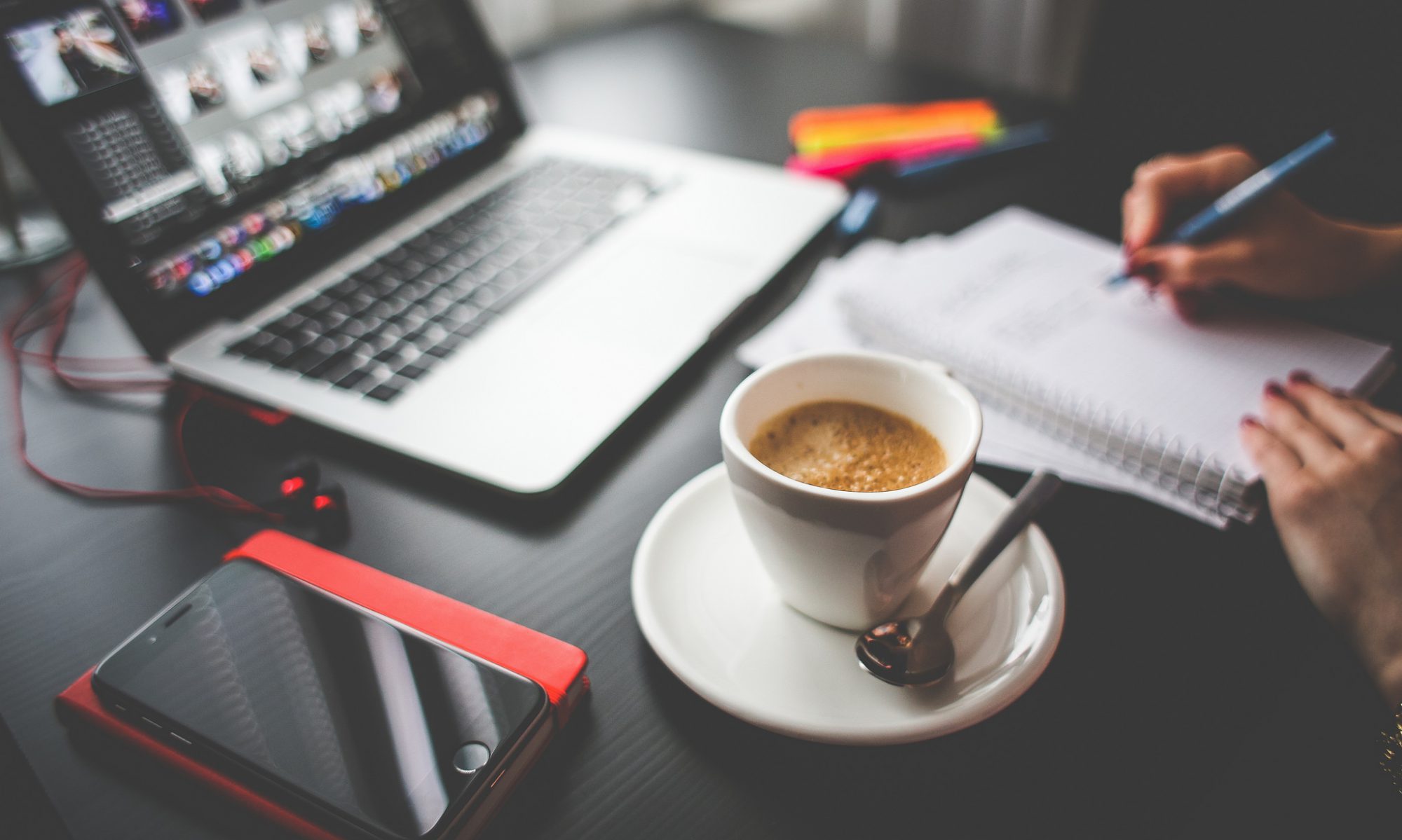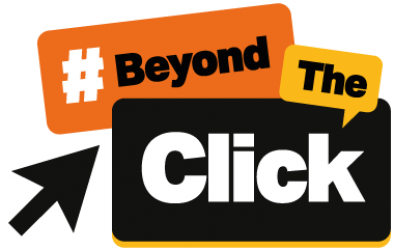Case studies: Women's Rights
#Women2Drive
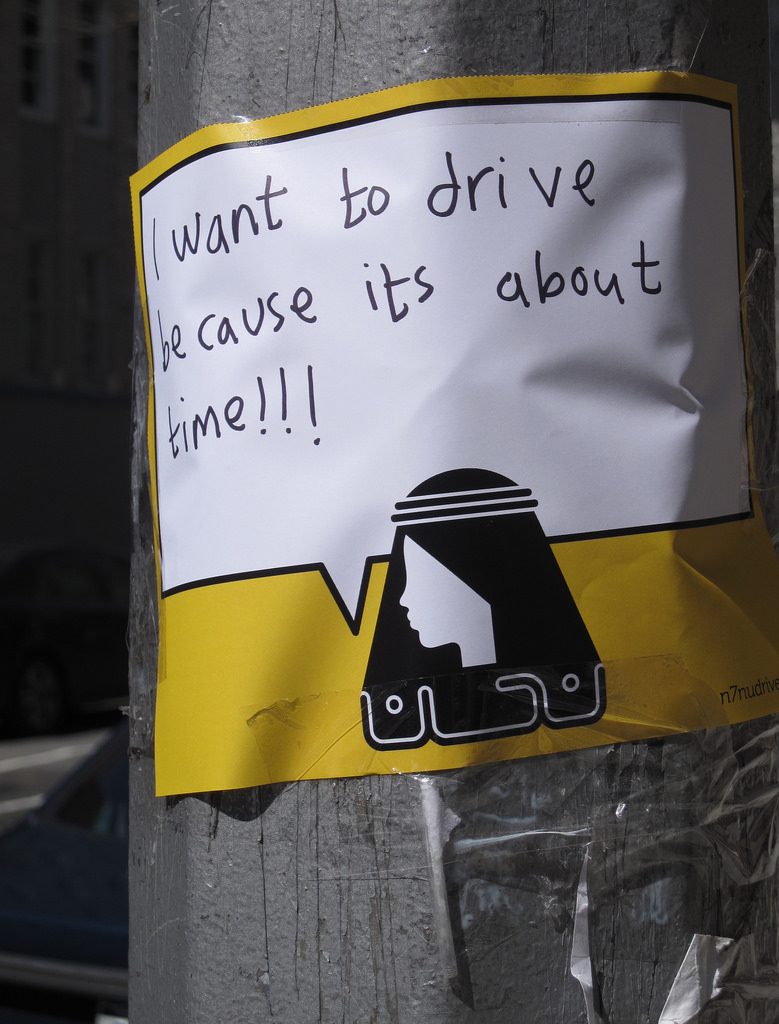
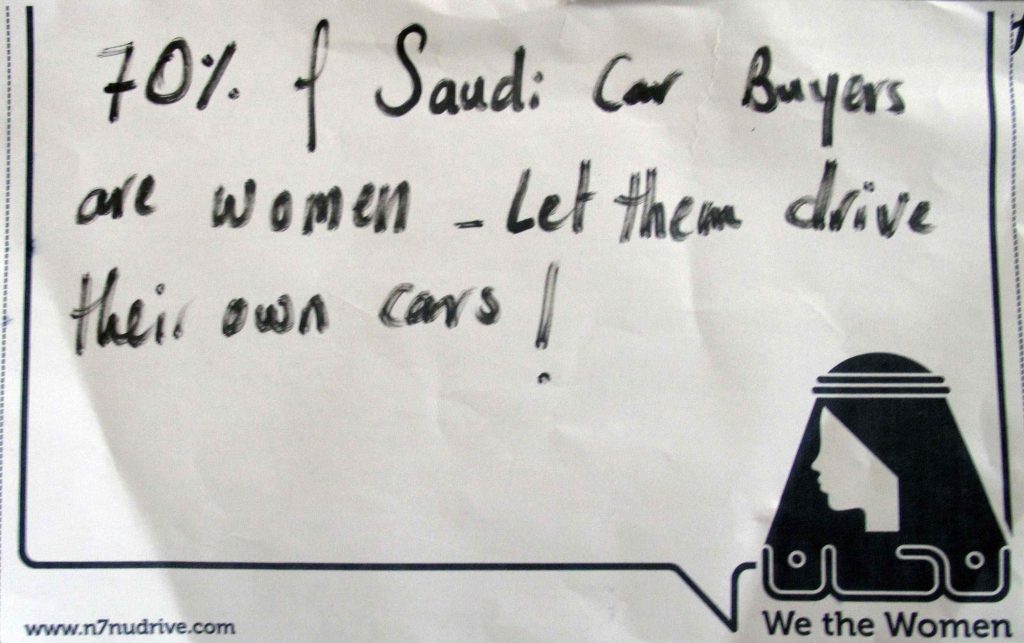
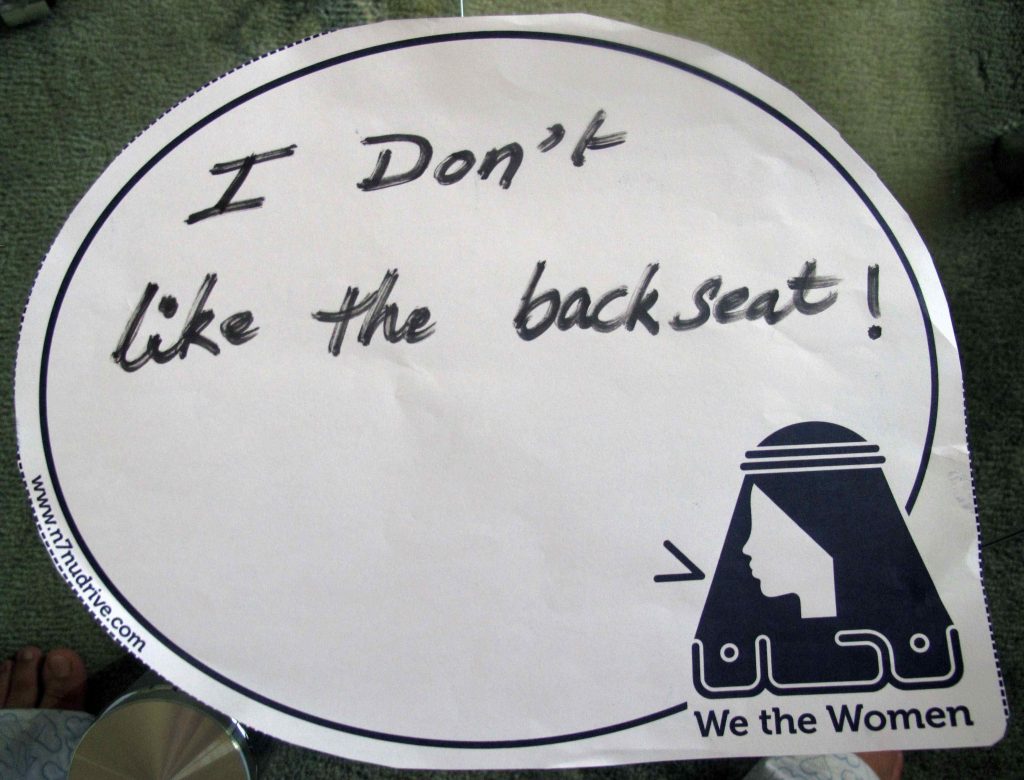
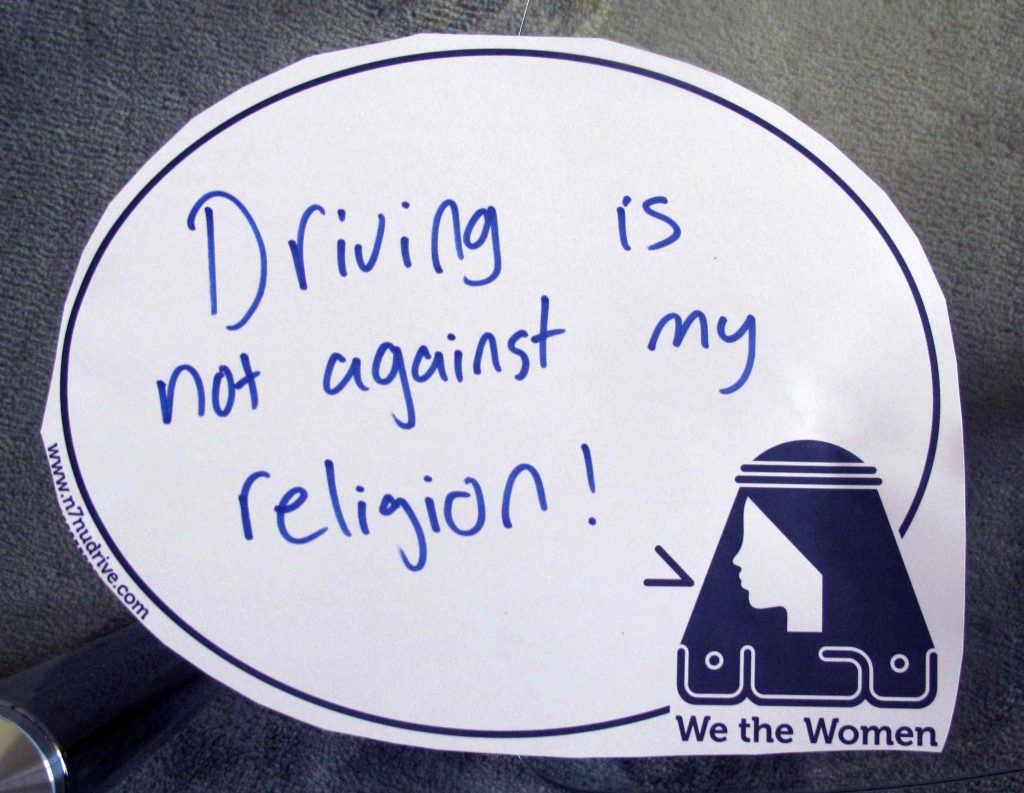
The story: Although there is no legislation against women driving in Saudi Arabia, a fatwa (moral law) against public “gender mixing” prohibits it. The fatwa is enforced by the country’s morality police, the muttaween. Women (often carrying foreign driving licences) caught driving are taken to a police station, usually with their father or brother, to sign a pledge never to drive again.
In 2009, to generate social dialogue on the ban among Saudi citizens, a Saudi artist and graphic designer living in the US created a low-budget on- and offline campaign called ‘We the Women’. Adapting the thesis she had produced while studying at the School of Visual Culture in New York, Areej Khan designed a set of “declaration bubble” stickers and encouraged people to print them out, fill in their thoughts, and then distribute them in public spaces — including on cars. Supporters were also encouraged to photograph their personalised stickers and upload them to the N7nu – We the Women’s Flickr set or Facebook page, or to email them to Khan anonymously.
The who: Areej Khan, Saudi women
The issues: women’s rights, driving, consumption, autonomy, nonviolent protest
The campaign hashtag: #Women2Drive
The medium: Facebook, Flickr, YouTube
The timeframe: 2009 – 2017
#NewProfilePic#Women2Drive @LatuffCartoons ❤️ pic.twitter.com/KQ4n0Zblp1
— منال مسعود الشريف (@manal_alsharif) September 26, 2017
You want a statement here is one: "Saudi Arabia will never be the same again. The rain begins with a single drop" #Women2Drive ❤️
— Manal al-Sharif (@manal_alsharif) September 26, 2017
Good luck to women in Saudi Arabia defying the driving ban #women2drive #Iwilldrivemyself (Cartoon: @sdutbreen) pic.twitter.com/kP0Ll4RQck
— Feminist Pics (@FeministPics) October 26, 2014
The impact: The Facebook page was central to the campaign, becoming a central point of discussion on the issue of women driving. “Most of the people participating on the Facebook page are against women driving,” said Khan. “There’s back and forth and debate on the group. I had to be prepared [for the fact that] I can’t control what this is at the end. It’s about finding a solution as a community, not what I think or am attached to.”
The success and reach of the campaign was driven mainly by the people in Saudi Arabia who downloaded stickers and expressed their thoughts on the issue. By focusing on a question — “to drive or not to drive” — rather than a static message about women’s rights, the campaign opened itself up to the participation of a much wider audience (both those for and against women driving). This prevented the campaign from being cast off as the product of just another westernised, expat Saudi woman, and generated some healthy controversy and international media attention.
At the time, Khan said that although the project received many comments opposing women driving in Saudi Arabia, “a lot of people say they think that will change soon, because of the voice given to women by projects like this.”
- the #women2drive campaign, initiated two years later in 2011, renewed public interest and actions that women in Saudi Arabia could participate in directly.
- the campaign reached its peak on June 17 2013 when several women who had sat behind the wheel on the country’s roads filmed themselves as a stunt to normalise the experience of women driving, were briefly arrested by police.
- this included IT consultant Manal Al Sharif who was arrested following posting a video of herself and Wajeha al-Huwaider, a women’s rights activist, driving around and the two women talked about the limitations they face as women in the Gulf kingdom. The video garnered over 700K views on YouTube (see video above) and encouraged other women to talk about and engage in driving actions.
- the #Women2Drive positive deviance actions were extended by inviting women to apply for driving licenses and then, when their applications are inevitably rejected, to file lawsuits.
- the campaign drew international support over a number of years, which helped to keep it on the agenda and under the spotlight of global attention, particularly Amnesty International and Freedom House.
In September 2017 it was announced that the ban on women driving would end in June 2018. As the New York Times reported, ‘the ban has long marred the image of Saudi Arabia, even among its closest allies, like the United States, whose officials sometimes chafed at a policy shared only by the jihadists of the Islamic State and the Taliban’.
The success of the campaign has fed into a wider campaign in Saudi Arabia to end the guardianship system #IamMyOwnGuardian #StopEnslavingSaudiWomen, which started in 2016
Further reading:
- Saudi Arabia to allow women to obtain driving licences, September 2017, The Guardian
- womensrights.informationactivism.org
Note: this case study has been adapted from the infoactivism.org toolkit produced by the Tactical Tech Collective.
#FDL (female defence league) #endFGM
The story: 17-year old Fahma Mohammad from Bristol, one of nine daughters in a Muslim Somali family who came to Britain when she was seven, had been working with a local organisation (Integrate Bristol) on the issue female genital mutilation (FGM), which some of her classmates had endured. One estimate is that around 65,000 women in Britain have undergone some form of FGM, the highest number in Europe. Fahma felt strongly that teachers weren’t talking about it enough in schools, so started a petition calling on Education Secretary Michael Gove to write to all schools urging teachers to talk to students about it before the next summer holidays in a bid to protect girls from being mutilated during the “cutting season”.
Within 20 days of calling on the government on change.org petition to put education at the heart of tackling FGM the petition had attracted nearly 250,000 petition signatures as part of a wider campaign involving The Guardian newspaper. No-one thought that Michael Gove would agree – but he did ask her and her friends into a meeting at the department for education.
The who: Fahma Mohammad, Integrate Bristol, The Guardian
The issues: Female Genital Mutilation, women’s rights, children’s rights
The medium: change.org online petition
The timeframe: February – May 2014
The impact: An hour after Fahma walked into a meeting with her five friends, the Education Secretary Michael Gove’s agreed to write to all headteachers in the UK within two months and include guidance relating to keeping children safe, specifically including material that will enable everyone working with young people to tackle female genital mutilation.
Fahma’s example has inspired anti-FGM campaigners around the world, including US-based FGM survivor Jaha Dukureh to lead a change.org petition in 2014 to improve data collection on women and girls in the US impacted by FGM and at risk of mutilation against a ‘a culture of silence about FGM in America’, garnering over 200,000 signatures. Jaha later became the leading campaigner against FGM in the Gambia, where FGM was banned in 2015
#darkisbeautiful
The story: This awareness campaign seeks to draw attention to the unjust effects of skin colour bias and also celebrates the beauty and diversity of all skin tones. It is organized by Women of Worth, a network of women as agents of change in India.
The campaign challenges the belief that the value and beauty of people (in India and worldwide), is determined by the fairness of their skin, arguing that this belief, shaped by societal attitudes and reinforced by media messages, is corroding the self-worth of people, young and old. By empowering women and standing up for justice and equality in every facet of life and society, WOW seeks to help women to be the best they can be.
The who: Women of Worth, India,
The issues: women, skin colour, attitudes, media messages, identity
The campaign hashtag: #darkisbeautiful
The medium: Twitter, Facebook, You Tube (interview about the campaign) and blog plus graphics
The timeframe: The campaign began in 2009
The impact: The campaign petition had 27,175 when it was closed. WOW claim a national discussion on the issue is underway with strong media awareness and national celebrity endorsements.
#IStandWithRekha
The story: In June 2015, the independent Indian social media platform, The Logical Indian and NGO Make Love Not Scars (an NGO providing acid attack victims an opportunity to regain their lives) began to highlight the issue and the lack of promised state compensation fact that compensation for such attacks was not became aware of the plight of acid attack victims’ recovery, due to lack of resources and support.
20-year old Rekha had suffered a brutal acid attack by her husband producing mental and physical trauma and had not received agreed compensation even after 1.5 years. Survivors are legally entitled to compensation and free preliminary medical aid from the government but this was not provided. This reality (hundreds of attacks are reported leaving many unreported) sparked the campaign #IStandWithRekha
The who: The Logical Indian and NGO Make Love Not Scars
The issues: acid attack survivors, physical and mental impact, compensation
The campaign hashtag: #IStandWithRekha
The medium: emails, Twitter and YouTube and a microsite on #SkillsNotScars
The timeframe: The campaign began in 2015 and continues
The impact: Thousands of emails were forwarded to the Indian government and 300,000+ people signed a petition with the result that compensation was released almost immediately and the Ministry of Health acted. Other organisations became involved (including the Meer Foundation, Human of Bombay and Hyper) and a job portal for acid attack survivors was created ‘SkillsNotScars’.
In November 2016, #SkillsNotScars launched 4 video CVs of acid attack survivors. Watch these videos online. (the first video by Sapna is displayed below):
These videos soon started trending on social media, and more acid attack survivors started registering themselves and pressure increased for the banning of uncontrolled acid sales – #EndAcidSale. The campaign won a gold at the 63rd Cannes Lions ad festival 2016.
#RapeCulture #Pearson #Education #Textbook
In this South African text book, school kids *have to* blame rape survivors to pass the testhttps://t.co/Fn6q8wU7Oo pic.twitter.com/5GJkczZNft
— Ben Phillips (@benphillips76) September 8, 2016
- Ben Phillips was the director of policy at ActionAid International, who called on Pearson for an apology
Yonela Palesa Moopelwa, posting to Facebook in July 2016:
“Please explain how this book got approved to be used in schools. This is an extract from the current Grade 10 Focus Life Orientation textbook, page 179. This activity is teaching our kids to justify rape!
How can this be allowed, in a country that already has horrifying rape statistics? Read the scenario, then the first question. How can anyone justify this? Miss Ashleigh Phillip sent an e-mail to the publisher Friday last week about this, no one has replied yet. SABC News Online and eNCAnews please look into this matter, with urgency.
This kind of material has no place in our society. This book must be removed from the national catalog before it causes a lot of damage to our society. Friends please share this post, make it viral! #RapeCulture”
The story: The publishing group Pearson came under pressure after a parent read a section of the book Focus Life Orientation Grade 10 Learners’ Book from publisher Pearson’s South African subsidiary Maskew Miller Longman. The textbook – aimed at children aged 15 and 16 – includes a question based on a girl’s account of being raped at a party and seemed to promote blaming the victim in order to answer the question ‘correctly’.
The textbook’s controversial activity only surfaced on social media after a parent, Yonela Palesa Moopelwa posted a question and screenshot of it on Facebook in July 2016.
At this point the book had been in circulation for 5 years. South Africa has one of the highest instances of rape in the world with police statistics recording 147 sexual offenses a day (and so many cases go unreported), according to the UN.
Yonela’s action inspired the South African campaigning petition website Awethu Amandla to post a petition online calling on Department of Basic Education and Training to
- commit to immediately engage all high school teachers and all students must be engaged on why this section of the textbook is completely wrong.
- undo the damage of the last 5 years and review their curriculum approval process, and
- immediately remove the controversial section of the textbook as we can’t wait for the next edition
The text accompanying the petition reads:
“The textbook has been used for the last five years, meaning there is an entire generation that has been taught to blame rape victims.
Teachers should not be put in a position where they are expected to stigmatise and victim blame rape victims.’
The who: Parent, Yonela Palesa Moopelw
The medium: Facebook, South Africa public petitions website awethu.amandla.mobi
The issues: education, girls’ rights, rape culture, sex education
The hashtags: #RapeCulture #Pearson
The time-frame: September 2016
The impact: The ‘Undo the damage of rape culture promoting textbook‘ petition received 1,889 signatures.
A spokesperson for Pearson responded: “We have been made aware of the wording in the publication. We do not believe this sentence is an accurate reflection of how the topic of responsible development is taught and we have immediately amended the language.”
Corrections were submitted to South Africa’s department of basic education, and an update of the textbook is underway.
But even with a reprint, the damage can’t be reversed, as the petition notes:
‘The textbook has been used for the last five years, meaning there is an entire generation that has been taught to blame rape victims.’
In discussing the case, the 2017/18 Global Education Monitoring Report noted, ‘Pearson is the world’s largest education company, operating in over 70 countries. Its near global monopoly raises questions about who has the authority and capacity to hold it accountable’.
On this occasion, one parent asking questions using social media prompted awareness and revision of a Pearson textbook, in circulation for five years.
#toxictwitter
As a company, Twitter is failing to respect women’s rights online.
The story: Twitter is one of the most popular social media platforms used by hundreds of millions of people around the world; from high-ranking female politicians to journalists, activists, writers and bloggers, to women who simply want to know what’s happening around them. Twitter can be a powerful tool for women to make connections and express themselves. In fact, the company has promoted itself as a place where ‘every voice has the power to impact the world.’
But for many women (and indeed men), Twitter is also platform where violence and abuse against them flourishes, often with little accountability.
‘Ensuring an internet free from gender-based violence enhances freedom of expression as it allows women to fully participate in all areas of life and is integral to women’s empowerment.’
– UN Special Rapporteur on Violence Against Women Dubravka Simonoci in Toxic Twitter report (2018) by Amnesty International
Beginning in 2017, Amnesty International organised a campaign to highlight the issue and to argue that Twitter is failing in its responsibility to respect women’s rights online by inadequately investigating and responding to reports of violence and abuse in a visible manner.
[Warning: the following videos and links contain offensive and explicit language]
For the campaign, documented in the 2018 report Toxic Twitter – A Toxic Place for Women, the violence and abuse many experience on Twitter has a detrimental effect on their right to express themselves equally, freely and without fear. Instead of strengthening women’s voices, the violence and abuse many women experience on the platform leads women to self-censor what they post, limit their interactions, and even drives women off Twitter completely.
The campaign highlights the value of Twitter and why women, for example, want to engage with it as a medium for expression. In this context, the campaign highlights the human rights responsibilities of Twitter and the correspondence and debate between the company and Amnesty.
Amnesty made several recommendations for how Twitter can take action, including:
- Sharing specific examples of violence and abuse that will not be tolerated
- Sharing data on response times to reports of abuse
- Ensuring that decisions to restrict content are consistent with international human rights law and standards.
Former CEO of Twitter Dick Costolo, acknowledged the Company’s failings in this regard:
‘We suck at dealing with abuse and trolls on the platform and we’ve sucked at it for years…We lose core user after core user by not addressing simple trolling issues that they face every day. I’m frankly ashamed of how poorly we’ve dealt with this issue during my tenure as CEO. It’s absurd. There’s no excuse for it.’ (2015)
Current Twitter CEO Jack Dorsey has also recognised the issues and commented:
‘Abuse is not part of civil discourse. It shuts down conversation and prevents us from understanding one another. No one deserves to be a target of abuse online and it doesn’t have a place on Twitter…’ (2015)
‘We love instant, public, global messaging and conversation. It’s what Twitter is and it’s why we’re here. But we didn’t fully predict or understand the real-world negative consequences. We acknowledge that now, and are determined to find holistic and fair solutions.’ (2018)
The who: Amnesty International
The issues: Abuse on Twitter, hate speech, racism, sexism and homophobia
Campaign hashtag: #toxictwitter
The medium: YouTube, Twitter and Facebook
The time-frame: April 2018 – today
The impact: Since the launch of the report, within a two-month period people have become active in the campaign in over 100 countries. In the first few weeks, over 5,500 digital activists joined Amnesty’s Troll Patrol and analysed more than 450,000 tweets exposing sexist, racist and homophobic abuse against women.
The organisation Data For Democracy became a partner in the campaign planning to use the data gathered to develop an algorithm that detects online abuse and create a gold standard for social media platforms to use machine learning to monitor and tackle online abuse.
I am projecting with @amnesty on #TwitterHQ in #SanFrancisco to illuminate https://t.co/bCGg7ito55 #ToxicTwitter https://t.co/CP1Ex1OGvU
— robin bell (@bellvisuals) March 21, 2018
How does violence that women in India face online affect them?
— Amnesty India (@AIIndia) May 14, 2018
Our campaigner @MariyaS87, discusses this with women who have faced online abuse for expressing their opinions @kavita_krishnan @kirubamunusamy @RanaAyyub @AudreyTruschke #ToxicTwitterhttps://t.co/xGd2hBcif4
Listen to these six women – activists, journalists & politicians in Northern Ireland – who describe the abuse they receive on #ToxicTwitter. Join @Amnesty as they call on @jack to enforce @Twitter’s Rules and truly tackle online violence. pic.twitter.com/OypAZUt5P1
— Amnesty Int'l NI (@AmnestyNI) March 21, 2018
To date, the campaign has registered 11k+ tweets, 34K emails sent to Twitter founder Jack Dorsey and 493K tweets have been analysed by over 6,000 digital volunteer campaigners.
High profile women in the UK have also spoken out publicly on the issue and this short video and report from the BBC summarises this aspect.
The impact of the campaign has yet to fully materialise, yet within 3 months the #ToxicTwitter campaign has mobilised over 6,000 digital decoder volunteers online who have made over 552,824 contributions as part of Troll Patrol actions in exposing abuse that silences women online.
By involving social media users directly in positive and active actions, the contributions to challenging toxic norms on social media are no longer being left to paid staff company monitors alone, despite the scale and reach of a social media giant such as Twitter.
Testimonies from three Data for Democracy campaigners and on signing up and getting involved in decoding online abuse :
